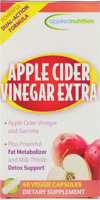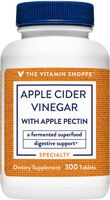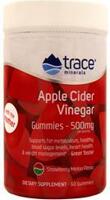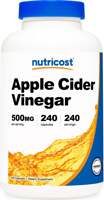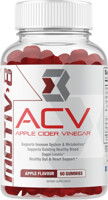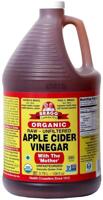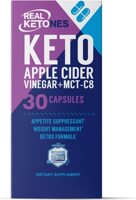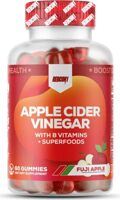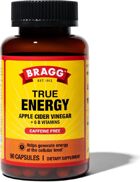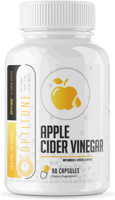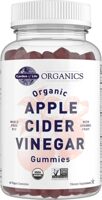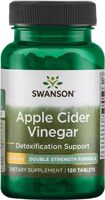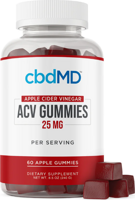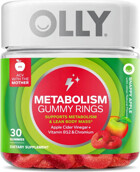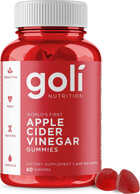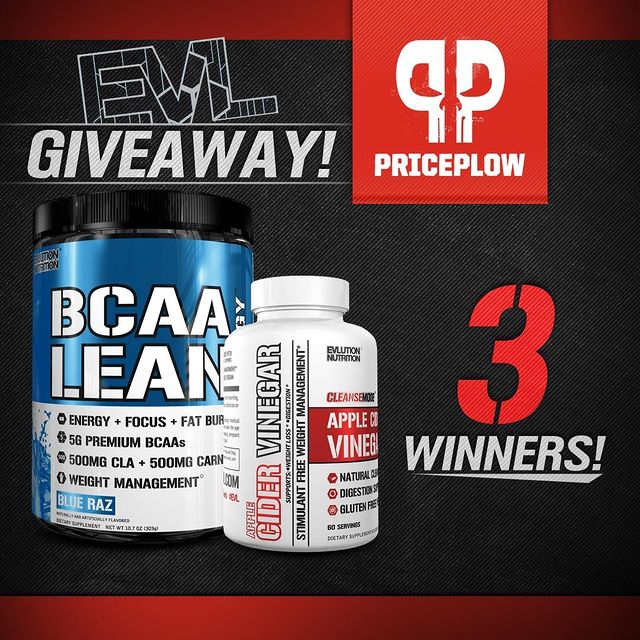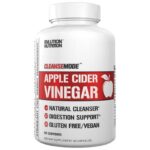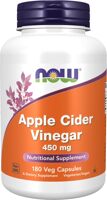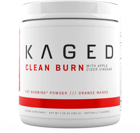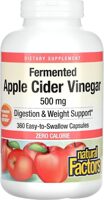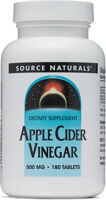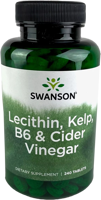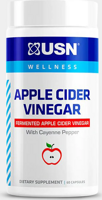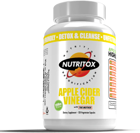Apple Cider Vinegar News on PricePlow
-
Apr 03, 2024 ![]()
Product News
Real Ketones Ketone Apple Cider Vinegar was created.
Category: Apple Cider Vinegar -
Feb 28, 2024 ![]()
Product News
Applied Nutrition Apple Cider Vinegar Extra was created.
Category: Apple Cider Vinegar -
Feb 21, 2024 ![]()
Product News
The Vitamin Shoppe Apple Cider Vinegar with Apple Pectin was created.
Categories: Apple Cider Vinegar, Apple Pectin -
Jan 29, 2024 ![]()
Product News
Trace Minerals Apple Cider Vinegar was created.
Categories: Apple Cider Vinegar, Gummy Supplements -
Jan 27, 2024 ![]()
Product News
The Vitamin Shoppe Apple Cider Vinegar Gummies was created.
Categories: Apple Cider Vinegar, Gummy Supplements -
Jan 08, 2024 ![]()
Product News
Nutricost Apple Cider Vinegar was created.
Category: Apple Cider Vinegar -
Dec 27, 2023 ![]()
Product News
Motiv8 Apple Cider Vinegar was created.
Categories: Apple Cider Vinegar, Gummy Supplements -
Dec 26, 2023 ![]()
Product News
FNX Apple Cider Vinegar Gummies was created.
Categories: Apple Cider Vinegar, Gummy Supplements -
Dec 21, 2023 ![]()
Product News
Bragg Apple Cider Vinegar has new variations: Category: Apple Cider Vinegar -
Dec 06, 2023 ![]()
YouTube Video
Kaged Clean Burn Original: Lemon Drop vs. Strawberry Lemonade -
Nov 22, 2023 ![]()
Product News
Real Ketones Keto Apple Cider Vinegar+MCT-C8 was created.
Category: Apple Cider Vinegar -
Aug 28, 2023 ![]()
Blog Post
Kaged Clean Burn Elite: Boost Fat Loss with Apple Cider Vinegar and InnoSlim
Kaged Clean Burn Elite is a weight loss drink enhanced with apple cider vinegar, with 166mg natural caffeine and InnoSlim! -
Aug 18, 2023 ![]()
Product News
Redcon1 Apple Cider Vinegar has new variations: Categories: Apple Cider Vinegar, Gummy Supplements -
Aug 14, 2023 ![]()
Product News
Bragg True Energy - Apple Cider Vinegar has new variations: Category: Apple Cider Vinegar -
Jul 16, 2023 ![]()
Product News
Bragg Apple Cider Vinegar Shot has new variations: Category: Apple Cider Vinegar -
Jul 09, 2023 ![]()
Product News
Bragg Apple Cider Vinegar has new variations: Category: Apple Cider Vinegar -
Jun 04, 2023 ![]()
Product News
Optitune by MuscleSport Apple Cider Vinegar was created.
Category: Apple Cider Vinegar -
May 21, 2023 ![]()
Product News
Garden of Life mykind Organics - Organic Apple Cider Vinegar has new variations: Categories: Apple Cider Vinegar, Gummy Supplements -
May 01, 2023 ![]()
Product News
Swanson Apple Cider Vinegar has new variations: Category: Apple Cider Vinegar -
Apr 24, 2023 ![]()
Product News
Swanson Apple Cider Vinegar has new variations: Category: Apple Cider Vinegar -
Mar 28, 2023 ![]()
Product News
cbdMD ACV (Apple Cider Vinegar) Gummies was created.
Categories: Apple Cider Vinegar, CBD Oil, Gummy Supplements -
Mar 03, 2023 ![]()
Product News
Swanson Apple Cider Vinegar was created.
Category: Apple Cider Vinegar -
Jan 29, 2023 ![]()
Product News
Bragg True Energy - Apple Cider Vinegar was created.
Category: Apple Cider Vinegar -
Jan 14, 2023 ![]()
YouTube Video
Great-Tasting Superfoods Powder? Kaged Outlive 100 Now in Lemon! -
Dec 25, 2022 ![]()
Product News
Bragg Apple Cider Vinegar Drink was created.
Category: Apple Cider Vinegar -
Jul 24, 2022 ![]()
Product News
Garden of Life mykind Organics - Organic Apple Cider Vinegar was created.
Categories: Apple Cider Vinegar, Gummy Supplements -
Jun 06, 2022 ![]()
Product News
Olly Metabolism Gummy Rings was created.
Categories: Apple Cider Vinegar, Gummy Supplements -
May 09, 2022 ![]()
Product News
Goli Nutrition Apple Cider Vinegar Gummies was created.
Categories: Apple Cider Vinegar, Gummy Supplements -
Apr 30, 2022 ![]()
YouTube Video
STOP DRINKING YOUR ACV... Take this | Kaged Clean Burn Apple Cider Vinegar -
Apr 27, 2022 ![]()
Blog Post
Clean Burn Powder: Kaged Enhances Fat Loss with Apple Cider Vinegar
Clean Burn Powder is a new apple cider vinegar enhanced fat burning drink from Kaged, providing 166 milligrams of natural caffeine alongside ACV! -
Jan 24, 2019 ![]()
Giveaway Contest
GIVEAWAY Time: Three lucky winners will be going home with @EVLSports BCAA Lean Energy and Apple... -
Dec 12, 2018 ![]()
Blog Post
EVLSports Apple Cider Vinegar Capsules Save Your Tooth Enamel!
EVLSports CleanseMode Apple Cider Vinegar capsules prevent the biggest ACV side effect: they keep the apple cider vinegar AWAY from your tooth enamel!
Sign up for future Apple Cider Vinegar news!
Click the button below to sign up for future Apple Cider Vinegar news, deals, coupons, and reviews!
Apple Cider Vinegar Price Alerts
The following price alerts are still active:
- Apr 19, 2024EVLution Nutrition Apple Cider Vinegar 60 Vcaps dropped by 36% to $6.06 at iHerb.com
- Apr 19, 2024Bragg Apple Cider Vinegar 16 Oz. (only Raw Unfiltered) dropped by 19.2% to $4.60 at iHerb.com
- Apr 15, 2024Vital Proteins Apple Cider Vinegar Gummies 60 Gummies dropped by 57.2% to $14.79 at VitaCost.com
- Apr 13, 2024Redcon1 Apple Cider Vinegar 180 Capsules dropped by 35% to $12.99 at Amazon
- Apr 13, 2024Redcon1 Apple Cider Vinegar 60 Gummies dropped by 25% to $14.99 at Amazon
- Apr 06, 2024Bragg Apple Cider Vinegar 16 Oz. (only Honey) dropped by 11.2% to $3.79 at VitaCost.com
- Mar 13, 2024Bragg Apple Cider Vinegar 16 Oz. (only Honey Cayenne) dropped by 23.4% to $9.99 at VitaCost.com
- Mar 08, 2024MuscleTech Apple Cider+ SX-7 Black Onyx 150 Tablets dropped by 16.6% to $9.99 at Walmart
- Mar 04, 2024Natural Factors Apple Cider Vinegar 180 Capsules (only 500mg) dropped by 7.3% to $12.29 at VitaCost.com
- Feb 19, 2024NOW Apple Cider Vinegar 180 Tablets dropped by 19.2% to $10.89 at AllStarHealth
- Feb 14, 2024Nutricost Apple Cider Vinegar 60 Gummies dropped by 16.4% to $9.49 at iHerb.com
- Feb 14, 2024Swanson Apple Cider Vinegar 180 Capsules dropped by 25.8% to $8.54 at iHerb.com
- Feb 11, 2024Trace Minerals Apple Cider Vinegar 60 Gummies dropped by 20% to $11.99 at AllStarHealth
- Jan 10, 2024USN Vibrance Apple Cider Vinegar 60 Vcaps dropped by 42.9% to $7.99 at Muscle and Strength
Sign up for future Apple Cider Vinegar deals and coupons!
Click the button below to sign up for future Apple Cider Vinegar deals, news, and coupons!
Apple Cider Vinegar Reviews & Videos
-
Dec 06, 2023Kaged Clean Burn Original: Lemon Drop vs. Strawberry Lemonade
-
Jan 14, 2023Great-Tasting Superfoods Powder? Kaged Outlive 100 Now in Lemon!
-
Apr 30, 2022STOP DRINKING YOUR ACV... Take this | Kaged Clean Burn Apple Cider Vinegar
Subscribe for more Apple Cider Vinegar news and alerts!
Subscribe to PricePlow on YouTube, follow PricePlow on Instagram or click the button below to sign up for our latest Apple Cider Vinegar news and reviews!

